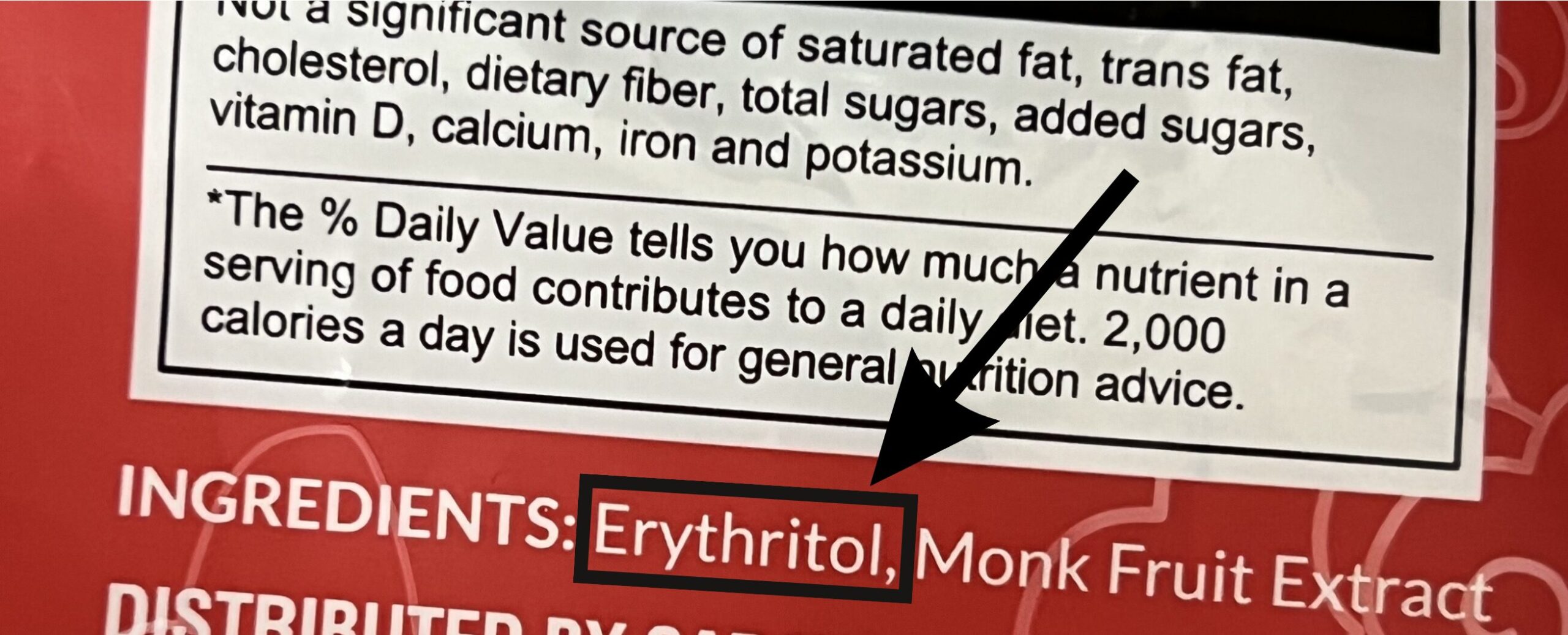Erythritol
Did you or a loved one suffer a cardiovascular event (heart attack, blood clot, or stroke) after regularly consuming products containing erythritol?
If so, you may be entitled to compensation from the responsible party.
Why might you or a loved one be entitled to compensation?
 Erythritol is a popular artificial sweetener that can be found in hundreds of foods and drinks like soft drinks, baked goods, and sugar-free candy and gum.
Erythritol is a popular artificial sweetener that can be found in hundreds of foods and drinks like soft drinks, baked goods, and sugar-free candy and gum.
Erythritol is a sugar-substitute—it looks like sugar and tastes like sugar but is considered calorie-free. Many people on diets eat products sweetened with erythritol, as do people with diabetes who are looking for a substitute for regular table sugar that does not boost blood sugar levels.
But a recent study, published in the journal Nature Medicine by researchers from Cleveland Clinic’s Lerner Research Institute, found an association between erythritol and cardiovascular risk, such as higher rates of heart attack, clotting, and stroke.
The study found that erythritol can increase a consumers’ risk of heart attacks, cardiac procedures, and strokes.
The researchers discovered that the artificial sweetener promoted blood clotting. When a blood clot breaks off, it can move to the heart and cause a heart attack or to the brain and cause a stroke. Researchers linked erythritol artificial sweetener to the following cardiovascular issues:
- Blood clotting
- Cardiac damage
- Heart attack
- Stroke
These potential dangers are present for those who had underlying health conditions such as diabetes or existing heart disease. These individuals were approximately two times more likely to have a heart attack or stroke if they had the highest levels of erythritol in their blood.
These health outcomes can be serious and result in permanent impairment or even death.
What products contain erythritol?
Many food products marketed to people looking to lose weight or follow specific diets such as keto, low-carb, or diabetes-friendly diets contain erythritol.
The following is a list of the common products that may contain erythritol:
- Sugar-free gum
- Sugar-free candy
- Baked goods, such as cookies, cakes, and muffins
- Ice cream and frozen desserts
- Protein bars and shakes
- Breakfast cereals and granolas
- Soft drinks, juices, and energy drinks
- Yogurt and other dairy products
- Jams and jellies
- Chocolate and other confectionery products
- Many brands of tabletop artificial sweeteners such as monk fruit, Lakonta, Swerve, Sukrin, and Truvia.
This is not a complete list. Many products labeled as “keto,” “low calorie,” “zero calorie,” or “zero sugar” often contain erythritol as a sugar substitute.
Consumers can also purchase pure erythritol — either granulated or powdered — to use as a sweetener.
Free Assessment
If you or a loved one has been diagnosed with a heart condition or suffered a heart attack, stroke, or other cardiovascular event after eating or drinking the artificial sweetener erythritol, you may qualify for an erythritol lawsuit.
Finding out if you have a potential claim is free and fast. Please go to this link for our intake form.
The link between erythritol and cardiovascular events.
What is erythritol?
Erythritol is a type of four-carbon sugar alcohol that is used as a zero-calorie sugar substitute and food additive.
Erythritol occurs naturally in many fruits and vegetables.
Food companies manufacture erythritol through fermentation of glucose from corn using enzymes and a fermentation process.
Erythritol looks like sugar and tastes like sugar but is considered calorie-free.
Many people on keto and low-carb diets eat products sweetened with erythritol as do people with diabetes who are looking for a substitute for regular table sugar that has zero calories and does not boost blood sugar levels.
Recent study finds a link between Erythritol and the risk of a cardiovascular event.
A recent study by researchers from Cleveland Clinic’s Lerner Research Institute, published in the journal Nature Medicine (“The Artificial Sweetener Erythritol and Cardiovascular Event Risk”) found a connection between erythritol and higher rates of a cardiovascular event, such as heart attack and stroke.
The Study’s findings are based on a series of studies and tests:
-
Discovery cohort.
- Untargeted three-year studies using plasma samples from patients undergoing diagnostic cardiac evaluation suggesting an association between erythritol and a risk of death, heart attack, and stroke.
-
Validation cohorts.
- Targeted three-year studies examining a cohort of 2,149 people in the United States and a cohort of 833 people in Europe with high rates of cardiovascular problems. The study found that in both cohorts, individuals with prevalent cardiovascular disease and those who experienced death, heart attack, or stroke over the three-year follow-up period had higher plasma levels of erythritol.
-
Intervention studies.
- Lab testing revealed an increased platelet aggregation response to Erythritol. The study found that where 8 volunteers were given a drink sweetened with 30 grams of erythritol, the levels of erythritol in their plasma were 1,000-fold higher than their baseline levels for hours afterwards.
The researchers observed: “Artificial sweeteners are widely used sugar substitutes, but little is known about their long-term effects on cardiometabolic disease risks. Here we examined the commonly used sugar substitute erythritol and atherothrombotic disease risk.”
The researchers discovered that the artificial sweetener promoted clotting in the blood. When a blood clot breaks off, it can move to the heart and cause a heart attack or to the brain and cause a stroke. “Our studies show that when participants consumed an artificially sweetened beverage with an amount of erythritol observed in many processed foods, markedly elevated levels in the blood are observed for days — levels well above those observed to enhance clotting risks,“ said Stanley Hazen, M.D., PhD, lead researcher.
They also found that people with certain health conditions like diabetes or existing heart disease were two times more likely to have a heart attack or stroke if they had the highest levels of erythritol in their blood.
A prominent law firm that represents defendant corporations recommended that “[t]hose who make and sell erythritol-containing products should consider adopting risk-mitigation strategies in light of the new regulatory and litigation risks presented by the study.”
We anticipate that, following this recent study, researchers will continue to examine the health risks and long-term effects of erythritol and other artificial sweeteners.
Various news outlets reported on the study including The New York Times, The Washington Post, Forbes, and CNN.
Who qualifies for an erythritol lawsuit?
You may qualify for an erythritol lawsuit if:
- You or a loved one ate or drank erythritol sweetener on a regular basis; and later had a cardiovascular event, such as:
- blood clotting
- cardiac damage
- heart attack
- stroke